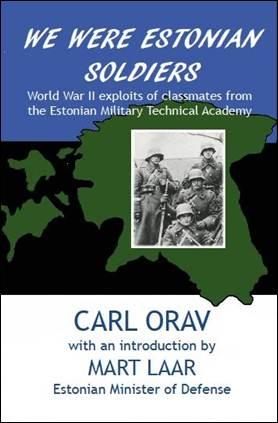In 1940, the peoples of the three small Baltic countries, Latvia, Lithuania and Estonia, were subjected to conquest by Stalin's armies in the months just after that rapacious tyrant ordered his armed forces to attack little Finland without provocation. The Baltic peoples were rounded up and tens of thousands sent off to prison in Siberia and throughout the Soviet Union, never to be seen again. As a percentage of the population, their numbers were staggeringly high. So when the Germans overran their countries in 1941, many of them saw it as liberation and fought on the side of the Germans.
The truth is they did not want to fight for either side, but they had no choice. Caught between the two most aggressive dictators of the 20th century they were doomed to fight for one side of the other, and sometimes for both. Today's book being reviewed would be a great place to start for anyone wishing to know more about this chapter of World War Two.

We Were Estonian Soldiers
Teadaanded 23 Dec 2011 EWR OnlineEesti Elu
A new book titled We Were Estonian Soldiers has been released describing Estonia’s involvement in World War II from a soldier’s viewpoint. It is written in English and consists of about 250 pages, enhanced with many illustrations and photos. The source material was gathered by the author’s father and is now in the Estonian War Museum in Viimsi, Estonia. The book will also soon be released in Estonia in our native language.
The stories are about five Estonian officers who were classmates at the Estonian Military Technical Academy during the years of 1936 thru 1940. Their detailed memoirs start with the Soviet occupation of Estonia and the outbreak of World War II. All were commissioned 2nd lieutenants upon their graduation from the academy in 1940. Then their lives took different paths.
Mart Laar, Estonia’s Minister of Defense, has written the introductory pages. He ends his introduction with the following words:
“Some of the following stories are simply fantastic. If one did not know that it is impossible to dream up such wild tales one would think them being simply unbelievable... Most of these men fought in both Soviet and German armed forces. Their aim was to keep the Red Army out of Estonia until war’s end when the Atlantic Charter of the allied forces would allow Estonia to regain its independence. It was no fault of theirs that it could not be achieved. What they did achieve was to instill a tradition of resistance which bore fruit 50 years later when Estonia again won its freedom from the occupying foreign power.
They were true Estonian soldiers. - Mart Laar, Sept. 4, 2011, Tallinn, Estonia”
Lt. Victor Orav started his military career in the Estonian Army which was soon disbanded and integrated into the Russian occupation forces. He deserted from the Red Army and ended up in a German prisoner of war camp. Life in camp was hard as attested by his body weight being only 88 lbs when released. He then served in the German SS and was heavily wounded in action. He and his family lived thru the heavy bombing of Tallinn. At the end of the war he managed to walk and ride on top of railroad cars from Czechoslovakia to western Germany in order to not fall into Russian hands.
Lt. Hugo Kubja likewise deserted from the Red Army. His story is one of survival in the woods of Estonia. At one point he had to shoot his way out of a situation which threatened his freedom. He took part in expelling the Red Army from Estonia at the battle of Tartu. Later, he saw action on the Leningrad front. At war’s end he made his escape to the west.
Lt. Edgar Reiksaar was captured by a Russian patrol after deserting from his Red Army unit. They thought him to be a German paratrooper and he was tried in a Soviet court for spying. The court found him guilty and he was ordered to be executed. He escaped but was later recaptured and executed with several bullets thru his head. Miraculously he survived. His ordeal and how he made it back to safety is stranger than fiction.
Lt. Johannes Jaagus lived thru the intrigues and fears brought on by the Soviet occupation. He wrestled with his soul when pressured to join the Communist Party. Spies and “death angels” brought angst and fear into his life. He lived thru several terrifying air raids while in the Red Army. He too chose an opportune moment to desert and become a prisoner of the Germans.
Lt. August Vohma was the consummate professional soldier. He saw continuous action throughout the war years. No matter what country’s uniform he was wearing he performed with distinction. He was first promoted to captain and then to the rank of major. At war’s end he was the ranking Estonian artillery officer in Germany. August’s story is also a love story. He met a young lady during the war who became his wife. His dogged search for her after the war involved some amazing twists of fate.
The English version of the book is available from:
http://lakeshorepressbooks.com...
You can find the article here:
http://www.eesti.ca/?op=article&articleid=34455
 Trüki
Trüki E-post
E-post

